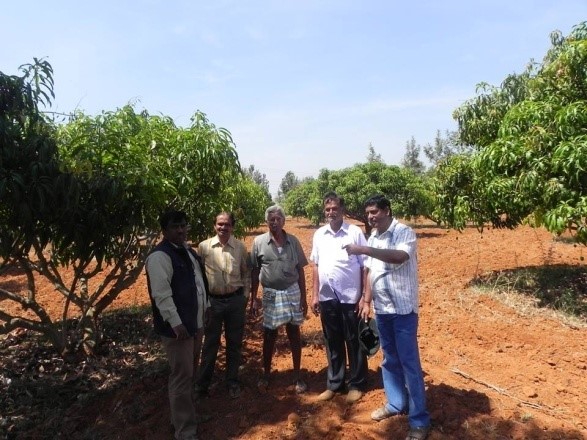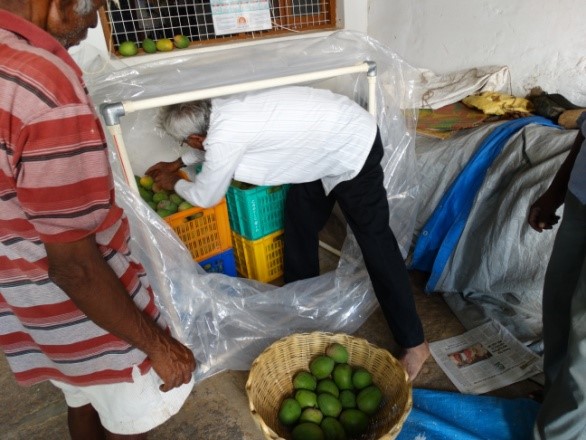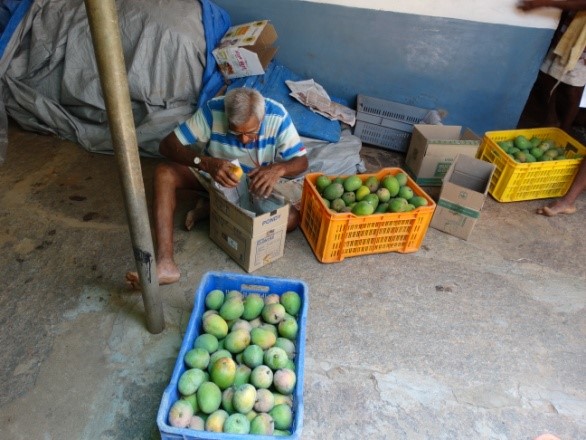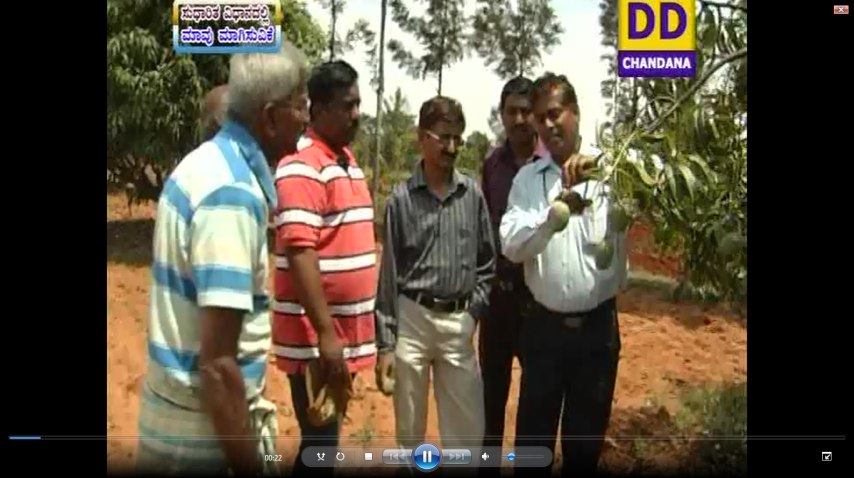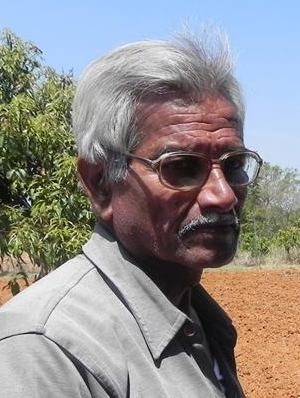
Sri. Revannasiddaiah, S/o Huchegowda, Neralapura Village, Tumakuru Taluk & District. Mobile: 9945465862
Sri. Revannasiddaiah, S/o Huchegowda, aged 67, is a Mango farmer from Neralapura village, Tumakuru District, Karnataka. Both husband and wife, studied up to S.S.L.C, are living in the village looking after their three acres mango orchard, while both the sons, educated are settled in Tumakuru and Hosakote. In the initial years, the farmer was in search of a suitable intervention for his three acres dry land farm. During 2003 he came into contact with Dr. B.M.C. Reddy, the then Director of Indian Institute of Horticultural Research (IIHR), Bengaluru. Based on his advice to go for Mango as a dryland horticulture intervention, he planted 74 grafted seedlings of Alphonso variety, initially in two acres of his land, in July 2004. Later in the year 2011, he purchased one more acre of adjacent land and continued mango cultivation in that land as well. Till 2009 he had contact with IIHR, Bengaluru and from 2010 onwards he came to know about the Krishi Vigyan Kendra (KVK), Hirehalli (under IIHR) at Tumakuru.
Dr. Reddy’s package of practices (PoP) includes application of 60 kg of FYM, every year as a blanket application and 5 kg of oil cake mixtures (neem, pongamia, groundnut etc) at the root zone. In the additional one acre farm he applies 20 kg of FYM and half kg of oil cake mixture every year. He applies water using a water tanker only during the non-rainy period – November to May (7 months). About 40 litres of water is being applied to each tree once in 10 days.
In the year 2010 onwards, the KVK, Hirehalli helped him with some of the technological interventions, viz., Mucuna (Velvet bean) as an intercrop for green manure (On Farm Trial), Micro Nutrients Foliar Spray (Mango special) for uniform mango size and increase in yield and use of Pheromone trap for monitoring Mango Fruit Flies (Front Line Demonstration). He was advised to apply Mango Special (75g of Mango Special Powder + 2 medium size Lemons + One sachet shampoo in 15 litres of water) to his entire orchard on monthly interval. He installed about 12 fruit fly traps in his 2 acres.
In the year 2010, from the first bearing, he got a yield of 480 Kgs. That was when a contractor approached him for a rate contract. The contractor asked for Rs.8000 for the whole orchard. But, the farmer thought otherwise and decided to sell the mangoes on his own. He came into contact with Dr. Rajendra Keni, General Physician at Sadashivanagar, a posh locality in Bengaluru city. The Doctor was aware of the quality of his mangoes, which were ripened on traditional method using paddy straw, free from calcium carbide, safe for health. Initially the farmer sold mangoes at prevailing market price. Once customers tasted Nelarapura Mangoes from the orchard of Sri. Revannasiddiah, they came back asking for same quality mangoes because they were free from fruit flies and were naturally ripened and tasty. Customers themselves offered premium prices for the quality produce. So, the farmer found a good market and started selling them directly to the Doctor’s family members and friends. The Doctor, in turn started prescribing these quality mangoes to his clients and other friends. Thus, Sri. Revannasiddaiah decided to sell the mangoes regularly to these customers, who were ready to pay premium prices. That year finally he got a gross return of Rs.40,000, five times more than what the contractor had asked for! The customers keep in touch with the farmer for quality mangoes every year.
During 2011, the yield was 2400 kg. This time 1020 kg of graded fruits were packed and sold @ Rs 500 per box (of 6 kg). The remaining 1380 kg were sold to a contractor for Rs.25,000 at farm price. Whereas, the farmer sold graded mangoes for a whopping amount of Rs.85,000! The yield also started increasing every year but price is kept at Rs.500 per box till 2013.
Table 1: Increase in income through direct marketing
| Income through contractor | Income through direct marketing | Percentage increase in gross income | ||||
| Production (kg) | Income (Rs.) | Average gross income per kg (Rs.) | Production (kg) | Income (Rs.) | Average gross income per kg (Rs.) | |
| 1380 | 25000 | 18 | 1020 | 85000 | 83 | 361 |
In the year 2014, the bearing was comparatively less than the previous years and prices were also crashed due to some market related reasons. But, still he managed to sell them off for Rs.1,20,000. KVK has introduced Low Cost Mango Ripening Chamber to him. It is a small one cubic meter structure made of plastic pipes and polythene sheets. Mangoes (about 8 crates -1250 fruits) used to be kept in the chamber for 24 hours. In one cubic meter structure only 75 per cent of space for fruit was occupied. Inside the chamber, Ethylene solution (2%) and Sodium hydroxide (0.5 gms) were mixed and kept in a bowl. The controlled fumigation technique helped him to speed up the ripening process, whereas the dangers of using calcium carbide were completely avoided. In traditional ripening method, it used to take 10 days for ripening and change in colour. But using this low cost ripening technology, fruits are taken outside the chamber after 24 hours, and within 5 days they attain uniform colour. After keeping the mangoes for the specified period, he used to remove and pack them in used carton boxes. He sold 200 such boxes, each 6 kg of mangoes (in total 1200 kgs). On an average he sold them for Rs.100 per kg, which was much higher than the prevailing rate for Alphonso variety at that time. For transport to Bengaluru, all he invested was Rs.1400 per trip and in each trip he carried about 100 boxes. Thus the farmer made a fortune by producing and selling his mangoes by using simple technologies suggested by IIHR and KVK. His interview on Low Cost Mango Ripening Chamber Technology was telecasted in Doordarshan – Chandana channel on 12th & 13th of June 2014.
Sri. Revannasiddaiah earned about two lakhs rupees in a short period of time by following the methodologies suggested by KVK (IIHR) for production and post-harvest care of mangoes. Recently, he purchased a TVS Moped from this income. Now, he also motivates several other neighboring farmers to adopt the scientific cultivation and processing methods offered by the KVK.
